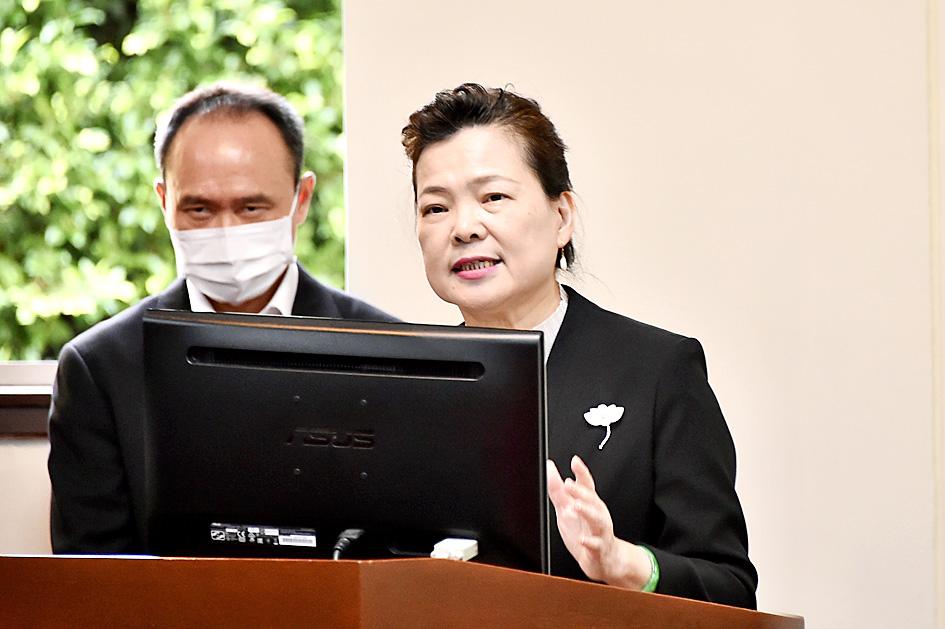Minister of Economic Affairs Wang Mei-hua (王美花) yesterday rejected opposition lawmakers’ calls to assign a product code for US pork and beef containing ractopamine.
Facing a barrage of questions from lawmakers at a meeting of the legislature’s Economics Committee, Wang said that giving meat containing residues of ractopamine a commodity classification code would sow confusion and could come under scrutiny by the WTO.
“Ractopamine is not a [meat] product, it is an additive,” said Wang, when questioned by Taiwan People’s Party (TPP) Legislator Chiu Chen-yuan (邱臣遠). “If we had a serial code for every additive it would cause confusion. There is no precedent for this internationally.”

Photo: Tu Chien-jung, Taipei Times
“Why not be the first?” Chiu asked.
Wang said that a product code for meat containing ractopamine would be “inconsistent with WTO regulations.”
“The average Taiwanese does not about WTO rules,” Chiu said. “They are just worried about what they are eating.”
Ractopamine is a leanness-enhancing drug that some US farmers give to their cattle and swine. It is banned in the EU and some other countries amid concern that it could adversely affect human health.
President Tsai Ing-wen (蔡英文) on Aug. 28 announced that Taiwan would lift the bans on US pork containing ractopamine and beef from cattle more than 30 months old, which is scheduled to take effect on Jan. 1.
Wang said there must be a “scientific basis” for singling out meat containing ractopamine.
“We have been importing US beef [from cattle under the age of 30 months] for eight years, and US pork is exported to more than 100 countries, while only 24 countries ban it,” Wang said. “If it was not safe, we would not lift the ban.”
Chinese Nationalist Party (KMT) Legislator Lai Shyh-bao (賴士葆) challenged Wang, asking the minister to livestream for a month herself eating US pork to prove that it is safe.
“After January 1, I want you and your husband to eat US pork for lunch or dinner every day for a month for all of use to see,” he said.
Wang said she would eat US pork, “but it is not necessary to eat it for a whole month in front of the camera,” she said, adding: “Taiwanese pork tastes better.”
Wang reiterated that importing US pork is a necessary step to further solidify Taiwan-US trade ties, to which KMT Legislator Yang Chiung-ying (楊瓊瓔) asked, if there have been any advancements in bilateral ties since Tsai’s announcement that she was lifting the ban.
“When are we going to sign a bilateral trade agreement [BTA] with the US?” Yang asked.
The ban “is an obstacle to the BTA,” Wang said.
“We must remove the obstacle first to fight for the next step,” she added.

GROWING OWINGS: While Luxembourg and China swapped the top three spots, the US continued to be the largest exposure for Taiwan for the 41st consecutive quarter The US remained the largest debtor nation to Taiwan’s banking sector for the 41st consecutive quarter at the end of September, after local banks’ exposure to the US market rose more than 2 percent from three months earlier, the central bank said. Exposure to the US increased to US$198.896 billion, up US$4.026 billion, or 2.07 percent, from US$194.87 billion in the previous quarter, data released by the central bank showed on Friday. Of the increase, about US$1.4 billion came from banks’ investments in securitized products and interbank loans in the US, while another US$2.6 billion stemmed from trust assets, including mutual funds,

AI TALENT: No financial details were released about the deal, in which top Groq executives, including its CEO, would join Nvidia to help advance the technology Nvidia Corp has agreed to a licensing deal with artificial intelligence (AI) start-up Groq, furthering its investments in companies connected to the AI boom and gaining the right to add a new type of technology to its products. The world’s largest publicly traded company has paid for the right to use Groq’s technology and is to integrate its chip design into future products. Some of the start-up’s executives are leaving to join Nvidia to help with that effort, the companies said. Groq would continue as an independent company with a new chief executive, it said on Wednesday in a post on its Web

Even as the US is embarked on a bitter rivalry with China over the deployment of artificial intelligence (AI), Chinese technology is quietly making inroads into the US market. Despite considerable geopolitical tensions, Chinese open-source AI models are winning over a growing number of programmers and companies in the US. These are different from the closed generative AI models that have become household names — ChatGPT-maker OpenAI or Google’s Gemini — whose inner workings are fiercely protected. In contrast, “open” models offered by many Chinese rivals, from Alibaba (阿里巴巴) to DeepSeek (深度求索), allow programmers to customize parts of the software to suit their

JOINT EFFORTS: MediaTek would partner with Denso to develop custom chips to support the car-part specialist company’s driver-assist systems in an expanding market MediaTek Inc (聯發科), the world’s largest mobile phone chip designer, yesterday said it is working closely with Japan’s Denso Corp to build a custom automotive system-on-chip (SoC) solution tailored for advanced driver-assistance systems and cockpit systems, adding another customer to its new application-specific IC (ASIC) business. This effort merges Denso’s automotive-grade safety expertise and deep vehicle integration with MediaTek’s technologies cultivated through the development of Media- Tek’s Dimensity AX, leveraging efficient, high-performance SoCs and artificial intelligence (AI) capabilities to offer a scalable, production-ready platform for next-generation driver assistance, the company said in a statement yesterday. “Through this collaboration, we are bringing two